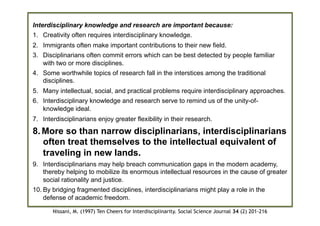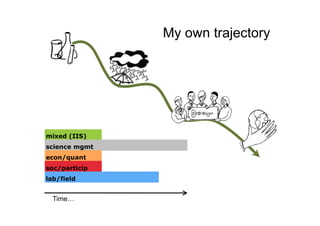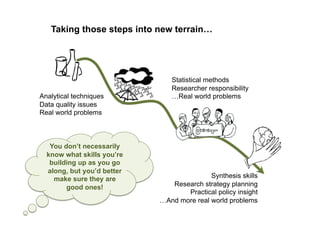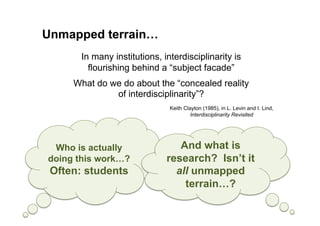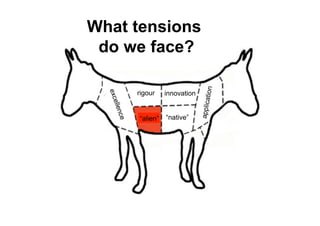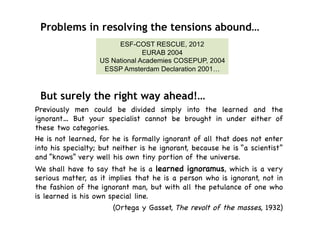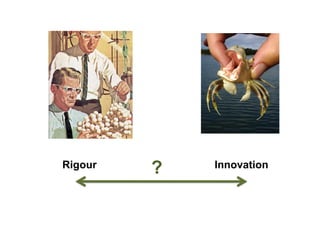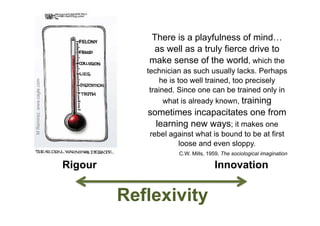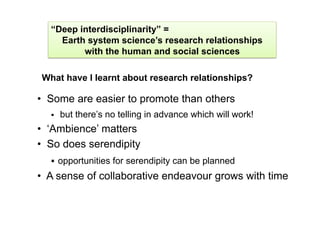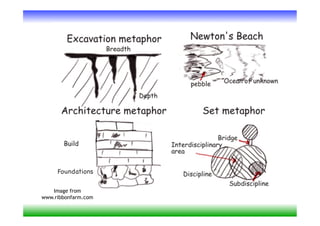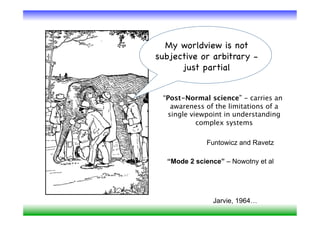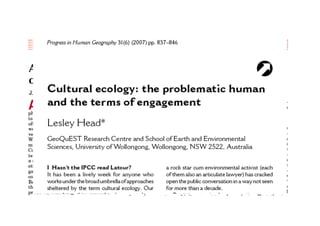SRC interdisciplinary terrain
- 1. Getting comfortable in new intellectual terrain (and shaping that terrain) ┬® Phelps 2006 Sarah Cornell Planetary Boundaries Research Initiative, SRC
- 2. Interdisciplinary knowledge and research are important because: 1.ŌĆ» Creativity often requires interdisciplinary knowledge. 2.ŌĆ» Immigrants often make important contributions to their new field. 3.ŌĆ» Disciplinarians often commit errors which can be best detected by people familiar with two or more disciplines. 4.ŌĆ» Some worthwhile topics of research fall in the interstices among the traditional disciplines. 5.ŌĆ» Many intellectual, social, and practical problems require interdisciplinary approaches. 6.ŌĆ» Interdisciplinary knowledge and research serve to remind us of the unity-of- knowledge ideal. 7.ŌĆ» Interdisciplinarians enjoy greater flexibility in their research. 8.ŌĆ» More so than narrow disciplinarians, interdisciplinarians often treat themselves to the intellectual equivalent of traveling in new lands. 9.ŌĆ» Interdisciplinarians may help breach communication gaps in the modern academy, thereby helping to mobilize its enormous intellectual resources in the cause of greater social rationality and justice. 10.ŌĆ»By bridging fragmented disciplines, interdisciplinarians might play a role in the defense of academic freedom. Nissani, M. (1997) Ten Cheers for Interdisciplinarity. Social Science Journal 34 (2) 201-216
- 4. Taking those steps into new terrainŌĆ” Statistical methods Researcher responsibility Analytical techniques ŌĆ”Real world problems Data quality issues Real world problems You donŌĆÖt necessarily know what skills youŌĆÖre building up as you go along, but youŌĆÖd better make sure they are Synthesis skills good ones! Research strategy planning Practical policy insight ŌĆ”And more real world problems
- 5. Unmapped terrainŌĆ” In many institutions, interdisciplinarity is flourishing behind a ŌĆ£subject facadeŌĆØ What do we do about the ŌĆ£concealed reality of interdisciplinarityŌĆØ? Keith Clayton (1985), in L. Levin and I. Lind, Interdisciplinarity Revisited Who is actually And what is doing this workŌĆ”? research? IsnŌĆÖt it Often: students all unmapped terrainŌĆ”?
- 6. Piece of advice No. 1ŌĆ” ŌĆóŌĆ» Have fun ŌĆō enjoy being undisciplined
- 7. What tensions do we face? rigour innovation ŌĆ£alienŌĆØ ŌĆ£nativeŌĆØ
- 8. Problems in resolving the tensions aboundŌĆ” ESF-COST RESCUE, 2012 EURAB 2004 US National Academies COSEPUP, 2004 ESSP Amsterdam Declaration 2001ŌĆ” But surely the right way ahead!ŌĆ” Previously men could be divided simply into the learned and the ignorantŌĆ” But your specialist cannot be brought in under either of these two categories. He is not learned, for he is formally ignorant of all that does not enter into his specialty; but neither is he ignorant, because he is ŌĆ£a scientistŌĆØ and ŌĆ£knowsŌĆØ very well his own tiny portion of the universe. We shall have to say that he is a learned ignoramus, which is a very serious matter, as it implies that he is a person who is ignorant, not in the fashion of the ignorant man, but with all the petulance of one who is learned is his own special line. (Ortega y Gasset, The revolt of the masses, 1932)
- 9. Rigour ? Innovation
- 10. There is a playfulness of mindŌĆ” as well as a truly fierce drive to make sense of the world, which the technician as such usually lacks. Perhaps he is too well trained, too precisely M Ramirez, www.cagle.com trained. Since one can be trained only in what is already known, training sometimes incapacitates one from learning new ways; it makes one rebel against what is bound to be at first loose and even sloppy. C.W. Mills, 1959, The sociological imagination Rigour Innovation Reflexivity
- 11. Piece of advice No. 2ŌĆ” ŌĆóŌĆ» Have fun ŌĆō enjoy being undisciplined ŌĆóŌĆ» Whatever you do, do it well
- 12. ŌĆ£Deep interdisciplinarityŌĆØ = Earth system scienceŌĆÖs research relationships with the human and social sciences What have I learnt about research relationships? ŌĆóŌĆ» Some are easier to promote than others ’é¦ŌĆ» but thereŌĆÖs no telling in advance which will work! ŌĆóŌĆ» ŌĆśAmbienceŌĆÖ matters ŌĆóŌĆ» So does serendipity ’é¦ŌĆ» opportunities for serendipity can be planned ŌĆóŌĆ» A sense of collaborative endeavour grows with time
- 13. Foundations Image from www.ribbonfarm.com
- 14. On pragmatismŌĆ” Timeframe Language Dis/Comfort
- 16. My worldview is not subjective or arbitrary - just partial ŌĆ£Post-Normal scienceŌĆØ - carries an awareness of the limitations of a single viewpoint in understanding complex systems Funtowicz and Ravetz ŌĆ£Mode 2 scienceŌĆØ ŌĆō Nowotny et al Jarvie, 1964ŌĆ”
- 17. Piece of advice No. 3ŌĆ” ŌĆóŌĆ» Have fun ŌĆō enjoy being undisciplined ŌĆóŌĆ» Whatever you do, do it well ŌĆóŌĆ» Read ŌĆō write ŌĆō THINK


